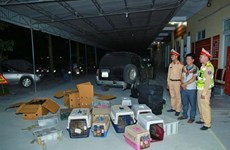Delta faces dire climate impacts
The Mekong Delta needs to take prompt and drastic measures to deal with
the steadily worsening problem of landslides and erosion, experts warn.
The Mekong Delta needs to take prompt and drastic measures to deal with
the steadily worsening problem of landslides and erosion, experts warn.
The problem gains added urgency as the region is highly susceptible to climate change impacts, including rising sea levels, in the coming years, they say.
They also say that one of the solutions that cannot be postponed is the building and strengthening of embankments and sea dykes in the most vulnerable localities.
The departments of natural resources and environment in several Mekong Delta provinces have reported that landslides and land erosion, mostly along the Tien and Hau rivers, have caused increasing damage in recent years.
The provinces of An Giang, Dong Thap and Ca Mau are among the hardest hit.
In Dong Thap province where the length of the affected area is estimated at about 200km. About 2,500 households have to be evacuated, according to local authorities.
Meanwhile, along the Cho Gao Canal in Tien Giang province, more than 200 areas have been damaged and are facing a worsening land erosion problem.
To avoid landslide, most families living here have had to move their houses backward at least 20-30 metres away from the river .
Nguyen Van Be of Tan Thuan Binh village in Cho Gao district, said, "I have moved my house back from the river twice, but the water levels continue to rise and will reach the house soon, but we have no more land to move back further."
Local authorities have been warning that climate change impacts in Cuu Long ( Mekong ) Delta region have worsened every year.
In Ca Mau Province, the sea levels rose by 15cm, 16cm and 21cm in 2007, 2008 and 2011, damaging 4,890ha, 10,600ha and 19,700ha of arable land respectively.
To Quoc Nam , deputy director of Ca Mau province's Department of Agriculture and Rural Development, said if the sea level continues to rise at such rates, about 90,000ha of arable land in Ca Mau, especially in Nam Can and Ngoc Hien districts, face a serious threat of being inundated.
Since 2000, Ca Mau has been suffering more frequent land erosion, Nam said. At present, the erosion has been taking place along nearly 10km of the province's coastline, with four areas impacted particularly badly, he added.
The situation is similar in Bac Lieu province where the sea level rise last year was reportedly the highest in the last 20 years.
Le Van Sa, director of Bac Lieu's Department of Hydro-meteorology, said the climate change scenario in the Cuu Long ( Mekong ) Delta region in general and the province in particular has become significantly worse over the last few years, impacting thousands of families living on the coast.
According to a report from the Ministry of Natural Resources and Environment, during the last 50 years, sea levels have risen by 12cm. It is expected to rise another 12cm, 17cm, 30cm and 75cm by 2020, 2030, 2050 and 2100 respectively.
The ministry has asked each locality, especially those in the Mekong Delta region, to develop a long-term strategy and clear roadmap to cope with sea level rises for each decade from now until 2100.-VNA
The problem gains added urgency as the region is highly susceptible to climate change impacts, including rising sea levels, in the coming years, they say.
They also say that one of the solutions that cannot be postponed is the building and strengthening of embankments and sea dykes in the most vulnerable localities.
The departments of natural resources and environment in several Mekong Delta provinces have reported that landslides and land erosion, mostly along the Tien and Hau rivers, have caused increasing damage in recent years.
The provinces of An Giang, Dong Thap and Ca Mau are among the hardest hit.
In Dong Thap province where the length of the affected area is estimated at about 200km. About 2,500 households have to be evacuated, according to local authorities.
Meanwhile, along the Cho Gao Canal in Tien Giang province, more than 200 areas have been damaged and are facing a worsening land erosion problem.
To avoid landslide, most families living here have had to move their houses backward at least 20-30 metres away from the river .
Nguyen Van Be of Tan Thuan Binh village in Cho Gao district, said, "I have moved my house back from the river twice, but the water levels continue to rise and will reach the house soon, but we have no more land to move back further."
Local authorities have been warning that climate change impacts in Cuu Long ( Mekong ) Delta region have worsened every year.
In Ca Mau Province, the sea levels rose by 15cm, 16cm and 21cm in 2007, 2008 and 2011, damaging 4,890ha, 10,600ha and 19,700ha of arable land respectively.
To Quoc Nam , deputy director of Ca Mau province's Department of Agriculture and Rural Development, said if the sea level continues to rise at such rates, about 90,000ha of arable land in Ca Mau, especially in Nam Can and Ngoc Hien districts, face a serious threat of being inundated.
Since 2000, Ca Mau has been suffering more frequent land erosion, Nam said. At present, the erosion has been taking place along nearly 10km of the province's coastline, with four areas impacted particularly badly, he added.
The situation is similar in Bac Lieu province where the sea level rise last year was reportedly the highest in the last 20 years.
Le Van Sa, director of Bac Lieu's Department of Hydro-meteorology, said the climate change scenario in the Cuu Long ( Mekong ) Delta region in general and the province in particular has become significantly worse over the last few years, impacting thousands of families living on the coast.
According to a report from the Ministry of Natural Resources and Environment, during the last 50 years, sea levels have risen by 12cm. It is expected to rise another 12cm, 17cm, 30cm and 75cm by 2020, 2030, 2050 and 2100 respectively.
The ministry has asked each locality, especially those in the Mekong Delta region, to develop a long-term strategy and clear roadmap to cope with sea level rises for each decade from now until 2100.-VNA













